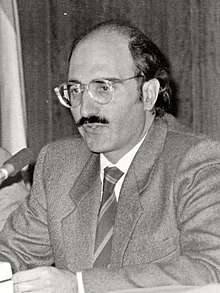Julián García Vargas
Julián García Vargas (born 1945) is a Spanish economist and socialist politician who served in different cabinets of Spain.
Julián García Vargas | |
|---|---|
 Julián García Vargas in 1986 | |
| Minister of Defense | |
| In office 13 March 1991 – 28 June 1995 | |
| Prime Minister | Felipe González |
| Preceded by | Narcís Serra |
| Succeeded by | Gustavo Suárez Pertierra |
| Minister of Health and Consumer Affairs | |
| In office 26 July 1986 – 13 March 1991 | |
| Prime Minister | Felipe González |
| Preceded by | Ernest Lluch |
| Succeeded by | Julián García Valverde |
| Personal details | |
| Born | 1945 (age 74–75) Madrid |
| Nationality | Spanish |
| Alma mater | Universidad Complutense de Madrid |
Early life and education
Garcia was born in Madrid in 1945.[1] He received a degree in economic sciences from the Universidad Complutense de Madrid in 1968.[2]
Career and activities
Garcia is an economist and healthcare expert by profession.[3] He is a member of the Socialist Workers' Party (PSOE).[3] He began his career in private sector and then joined public sector where he worked until 1986.[2]
He was appointed health minister on 26 July 1986 in the cabinet led by the then prime minister Felipe Gonzales.[4] Garcia was in office until March 1991.[2] He is considered to be one of the three Spanish health ministers who significantly improved health-care system of the country.[5] He was appointed defense minister on 12 March 1991 in a cabinet reshuffle.[1] He retained his post in the July 1993 reshuffle.[6] However, Garcia resigned from office on 2 July 1995 due to press reports revealing that the military secret services (CESED) had been spying on individuals and public figures.[1][7] Gustavo Suarez Pertierra succeeded Garcia as defense minister in a cabinet reshuffle.[8]
After leaving office he served as the special envoy of the European Union in Mostar (Bosnia) from November 1995 to April 1996 for the implementation of the Dayton Peace Agreement.[2] He was the president of the Spanish Association of Defense Technology, Aeronautics and Space Administration (TEDAE) until his resignation in June 2013.[9] He is the president of the Spanish Atlantic Association.[10] He has been board member of several companies.[2]
References
- "Julián García Vargas". Ministerio de Defensa. Archived from the original on 10 July 2012. Retrieved 11 July 2013.
- "Board of Directors". TYPSA Group. Archived from the original on 30 June 2013. Retrieved 1 June 2013.
- "The Spanish healthcare system will survive, but it requires urgent changes". ESADE. 28 February 2013. Retrieved 1 June 2013.
- Edward Schumacher (27 July 1986). "Changes are few as Spain swears in cabinet". The New York Times. Retrieved 5 September 2013.
- Miguel Labay Matías (3 March 2012). "Paediatrics, the People and Politicians in Spain – History, Development, Reality and Future". In Öner Özdemir (ed.). Contemporary Pediatrics (PDF). InTech. ISBN 978-953-51-0154-3.
- Phil Davison (14 July 1993). "Gonzalez brings independents into Spain's cabinet". The Independent. Madrid. Retrieved 4 September 2013.
- Víctor Pérez-Díaz (1999). Spain at the Crossroads: Civil Society, Politics and the Rule of Law. Harvard University Press. p. 87. ISBN 978-0-674-00052-0. Retrieved 1 June 2013.
- "Gonzalez Names New Ministers Following Phone-Tapping Scandal". Associated Press. 30 June 1995. Retrieved 19 October 2013.
- "Julián García Vargas deja de presidir la asociación de empresas de defensa". diariovasco (in Spanish). EFE. 27 June 2013. Retrieved 9 July 2013.
- "European defense and Transatlantic relations" (PDF). INCIPE. 15 December 2005. Archived from the original (PDF) on 12 February 2006. Retrieved 1 June 2013.